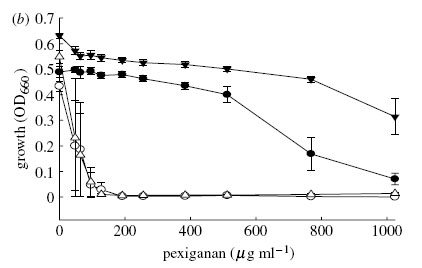The evolution of resistance to antibiotics is one of the most serious problems in developing effective medical therapies. We have shown that resistance to a novel class of antibiotics, antimicrobial peptides, readily evolves in the laboratory, despite claims that it would not. We have also investigated the genetic structure of Salmonella populations that are capable of causing serious disease outbreaks in domestic animals.
Related Publications
- Perron, G.G., Zasloff, M. & Bell, G. 2005. Experimental evolution of resistance to an antimicrobial peptide. Proceedings of the Royal Society of London B 273: 251-256. (see News and Views, Nature 438: 170-171, 2005).
- Bell, G. & Gouyon P.-H. 2003. Arming the Enemy: the evolution of resistance to self-proteins. Microbiology 149:1367-1375.
- Perron, G., Quesny, S. & Bell, G. 2007. Genotypic diversity and antimicrobial resistance in asymptomatic Salmonella enterica serotype Typhimurium DT104. Infection, Genetics and Evolution 7: 223-228. NSERC DG.
- Perron, G.G., Bell,G. & Quessy, S. 2008. Parallel evolution of multidrug resistance in Salmonella enterica isolated from swine. FEMS Microbiology Letters (2008) 1-6.
